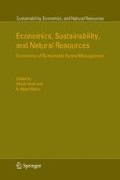Abstract
We show that the Suppes-Sen grading principle leads to stock-specific sustainability constraints in a class of resource models, provided that the resource is renewable or utility is derived directly from the resource stock. Decreasing the resource stock is not compatible with Suppes-Sen maximality, unless a smaller stock leads to higher natural growth.
Access this chapter
Tax calculation will be finalised at checkout
Purchases are for personal use only
Preview
Unable to display preview. Download preview PDF.
References
Asheim, G.B., Buchholz, W., & Tungodden, B. (2001). Justifying sustainability. Journal of Environmental Economics and Management, 41, 252–268.
Chichilnisky, G. (1996). An axiomatic approach to sustainable development. Social Choice and Welfare 13, 231–257.
Heal, G.M. (1998). Valuing the future: Economic theory and sustainability. New York: Columbia University Press.
Heal, G.M. (2001). Optimality or sustainability. Columbia University (paper presented at the EAERE 2001 Conference).
Krautkraemer, J.A. (1985). Optimal growth, resource amenities and the preservation of natural environments. Review of Economic Studies, 52, 153–170.
Mitra, T. (2005). Intergenerational equity and the forest management problem. Chapter 7 of this volume.
Pezzey, J.C.V., & Toman, M.A. (2002). Progress and problems in the economics of sustainability. In T. Tietenberg, H. Folmer, (Eds.), The international yearbook of environmental and resource economics 2002/2003. Cheltenham: Edward Elgar.
Sen, A.K. (1970). Collective choice and social welfare. Edinburgh: Oliver and Boyd.
Suppes, P. (1966). Some formal models of grading principles. Synthese, 6, 284–306.
Author information
Authors and Affiliations
Editor information
Editors and Affiliations
Rights and permissions
Copyright information
© 2005 Springer
About this chapter
Cite this chapter
Asheim, G.B., Buchholz, W. (2005). Can Stock-Specific Sustainability Constraints be Justified?. In: Kant, S., Berry, R.A. (eds) Economics, Sustainability, and Natural Resources. Sustainability, Economics, and Natural Resources, vol 1. Springer, Dordrecht. https://doi.org/10.1007/1-4020-3518-7_8
Download citation
DOI: https://doi.org/10.1007/1-4020-3518-7_8
Publisher Name: Springer, Dordrecht
Print ISBN: 978-1-4020-3465-7
Online ISBN: 978-1-4020-3518-0
eBook Packages: Earth and Environmental ScienceEarth and Environmental Science (R0)

